选择性必修 第二册 Unit 2Bridging Cultures Using Language (Listening and Speaking)课件(共20张PPT,内嵌音频)
文档属性
| 名称 | 选择性必修 第二册 Unit 2Bridging Cultures Using Language (Listening and Speaking)课件(共20张PPT,内嵌音频) |  | |
| 格式 | pptx | ||
| 文件大小 | 12.6MB | ||
| 资源类型 | 教案 | ||
| 版本资源 | 人教版(2019) | ||
| 科目 | 英语 | ||
| 更新时间 | 2023-08-17 13:23:50 | ||
图片预览

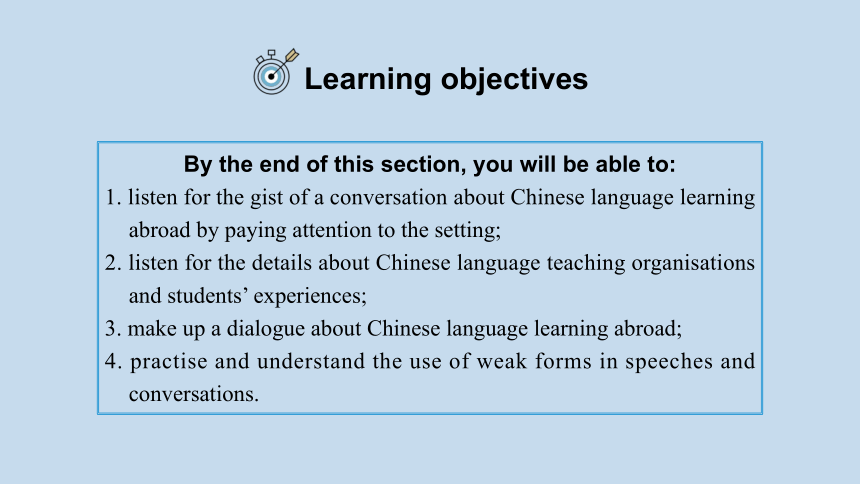


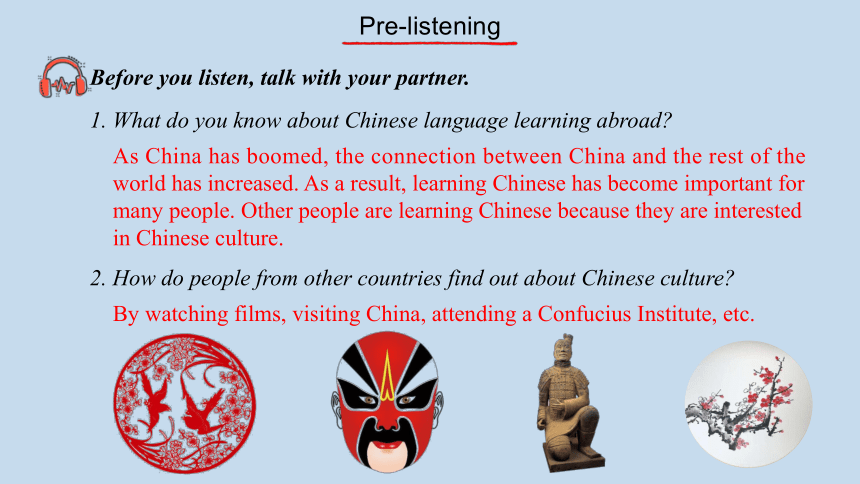
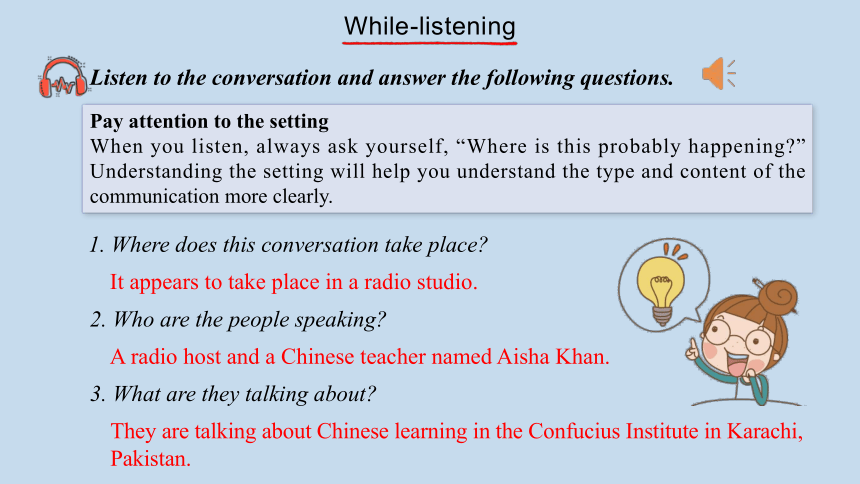

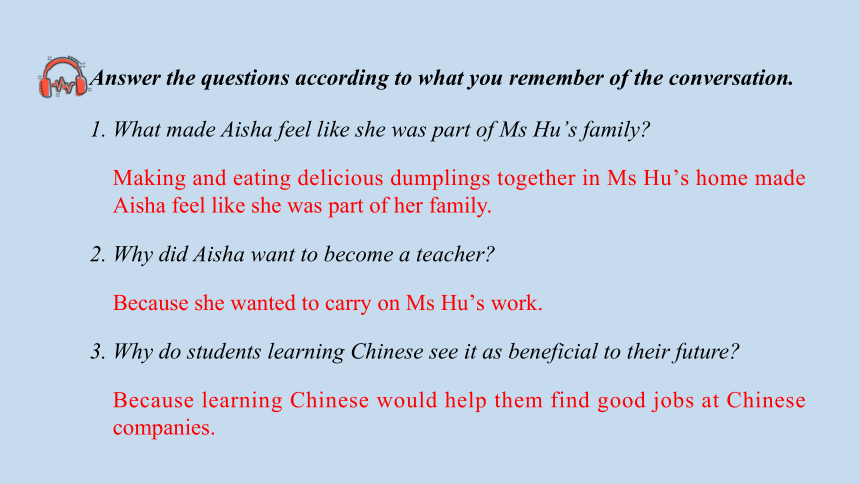
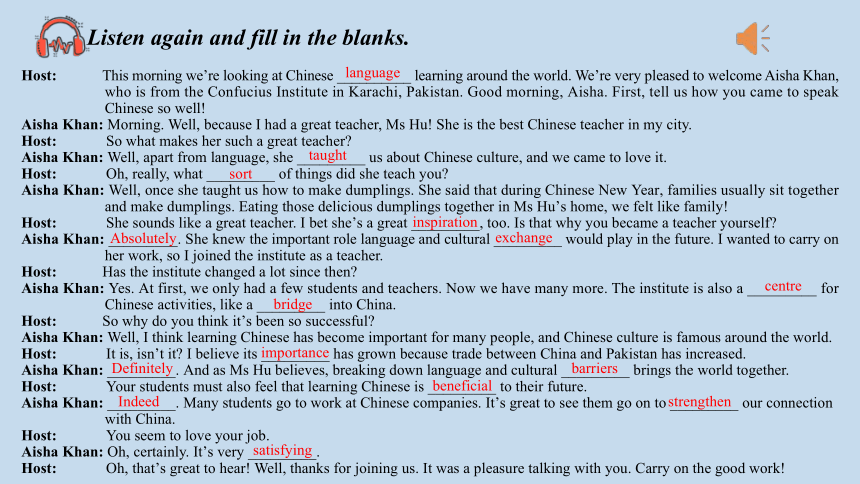
文档简介
(共20张PPT)
人教版(2019)选择性必修二
Unit 2 Bridging Cultures
Using Language
Talk about Chinese language learning abroad
Learning objectives
By the end of this section, you will be able to:
1. listen for the gist of a conversation about Chinese language learning abroad by paying attention to the setting;
2. listen for the details about Chinese language teaching organisations and students’ experiences;
3. make up a dialogue about Chinese language learning abroad;
4. practise and understand the use of weak forms in speeches and conversations.
What do you know about the Confucius Institute
Lead-in
With China’s rapid economic growth and wide exchanges with the rest of the world, there has been a sharp increase in the world demand for Chinese language learning. To meet the increasing demands for Chinese learning, the Chinese government decided to set up Confucius Institutes in foreign countries. The first Confucius Institute was set up in South Korea in 2004. Confucius Institutes adopt flexible teaching patterns to suit local conditions while teaching Chinese language and promoting cultural exchange in foreign schools, universities, communities, and enterprises.
What do you know about the Confucius Institute
1. What kind of organisation is the Confucius Institute
2. Do you think it is necessary to set up Confucius Institutes
It is an organisation set up in foreign countries to meet the increasing demands for Chinese learning.
Yes. They help foreigners to learn Chinese language and to learn something about Chinese culture. They play a very important role in spreading our culture and promoting culture exchange in foreign countries.
Before you listen, talk with your partner.
1. What do you know about Chinese language learning abroad
Pre-listening
2. How do people from other countries find out about Chinese culture
As China has boomed, the connection between China and the rest of the world has increased. As a result, learning Chinese has become important for many people. Other people are learning Chinese because they are interested in Chinese culture.
By watching films, visiting China, attending a Confucius Institute, etc.
While-listening
Listen to the conversation and answer the following questions.
Pay attention to the setting
When you listen, always ask yourself, “Where is this probably happening ” Understanding the setting will help you understand the type and content of the communication more clearly.
1. Where does this conversation take place
2. Who are the people speaking
3. What are they talking about
It appears to take place in a radio studio.
A radio host and a Chinese teacher named Aisha Khan.
They are talking about Chinese learning in the Confucius Institute in Karachi, Pakistan.
Listen again and take notes by filling in the poster below.
Welcome to the Confucius Institute.
Learn to ______________ and all about ______________!
Our institute has grown! We started with ________________________ but now we have many more.
It is a centre for ________________. You can learn and practise fascinating Chinese traditions.
Knowledge of the Chinese language and culture is important because of increasing ___________________________. Many students go on to great jobs in __________
____________.
Join us today to help break down language and _______________, and bring the world together!
speak Chinese
Chinese culture
a few students and teachers
Chinese activities
trade between China and Pakistan
Chinese
companies
cultural barriers
Answer the questions according to what you remember of the conversation.
1. What made Aisha feel like she was part of Ms Hu’s family
2. Why did Aisha want to become a teacher
3. Why do students learning Chinese see it as beneficial to their future
Making and eating delicious dumplings together in Ms Hu’s home made Aisha feel like she was part of her family.
Because she wanted to carry on Ms Hu’s work.
Because learning Chinese would help them find good jobs at Chinese companies.
Listen again and fill in the blanks.
Host: This morning we’re looking at Chinese __________ learning around the world. We’re very pleased to welcome Aisha Khan,
who is from the Confucius Institute in Karachi, Pakistan. Good morning, Aisha. First, tell us how you came to speak
Chinese so well!
Aisha Khan: Morning. Well, because I had a great teacher, Ms Hu! She is the best Chinese teacher in my city.
Host: So what makes her such a great teacher
Aisha Khan: Well, apart from language, she _________ us about Chinese culture, and we came to love it.
Host: Oh, really, what _________ of things did she teach you
Aisha Khan: Well, once she taught us how to make dumplings. She said that during Chinese New Year, families usually sit together
and make dumplings. Eating those delicious dumplings together in Ms Hu’s home, we felt like family!
Host: She sounds like a great teacher. I bet she’s a great _________, too. Is that why you became a teacher yourself
Aisha Khan: _________. She knew the important role language and cultural _________ would play in the future. I wanted to carry on
her work, so I joined the institute as a teacher.
Host: Has the institute changed a lot since then
Aisha Khan: Yes. At first, we only had a few students and teachers. Now we have many more. The institute is also a _________ for
Chinese activities, like a _________ into China.
Host: So why do you think it’s been so successful
Aisha Khan: Well, I think learning Chinese has become important for many people, and Chinese culture is famous around the world.
Host: It is, isn’t it I believe its _________ has grown because trade between China and Pakistan has increased.
Aisha Khan: _________. And as Ms Hu believes, breaking down language and cultural _________ brings the world together.
Host: Your students must also feel that learning Chinese is _________ to their future.
Aisha Khan: _________. Many students go to work at Chinese companies. It’s great to see them go on to _________ our connection
with China.
Host: You seem to love your job.
Aisha Khan: Oh, certainly. It’s very _________.
Host: Oh, that’s great to hear! Well, thanks for joining us. It was a pleasure talking with you. Carry on the good work!
language
taught
sort
inspiration
Absolutely
bridge
importance
Definitely
barriers
Indeed
strengthen
satisfying
beneficial
exchange
centre
Imagine you’re interviewing a student at a Confucius Institute in another country about his or her experience. Work with a partner to brainstorm what the interviewer might ask and how the student might answer. Then role-play the interview. Use the phrases and questions in the box to help you.
Post-listening
Interviewing someone
We are pleased to welcome ... What was your biggest challenge
Thanks for joining us. How did you overcome it
Tell us more about ... What are you keen on
Thanks for your time. What is the key to your success
It was a pleasure talking with you. What do you feel is your biggest
achievement
EXAMPLE
A: Hi, Jane. Welcome to the show!
B: Thanks for inviting me.
A: Tell us, what was your biggest challenge in learning Chinese at the beginning
B: Well, I suppose it was difficult to grasp the tones at first.
A: I bet! Did joining the Confucius Institute help overcome this problem
B: Absolutely! Getting involved with Chinese cultural activities there definitely helped a lot ...
A: Hi, Jane. Welcome to the show!
B: Thanks for inviting me.
A: Tell us, what was your biggest challenge in learning Chinese at the beginning
B: Well, I suppose it was difficult to grasp the tones at first.
A: I bet! Did joining the Confucius Institute help overcome this problem
B: Absolutely! Getting involved with Chinese cultural activities there definitely helped a lot. I got to practise my Chinese on a daily basis, and I could learn how native Chinese speakers spoke.
A: What do you feel is your biggest achievement
B: Learning Chinese characters! I have learnt about 1,500 so far. When I first started, I didn’t think it was even going to be possible to learn so many, but now I find that I can read signs, menus, and even some easy newspaper articles.
Sample Conversation
A: What are you most keen on
B: I’ve really become keen on learning more about the Chinese culture, in particular Chinese calligraphy. As I have learnt Chinese characters, I have developed a great appreciation for their meaning. I want to explore Chinese characters by learning how to write them in a more beautiful way.
A: Finally, what do you want to say to anyone interested in learning Chinese
B: I’d say, give it a shot! While some aspects may be difficult, it is quite rewarding and you will be happy that you tried.
A: Thanks for your time.
B: You’re welcome.
Sample Conversation
Read the conversation.
Pronunciation
Lu Yao: Excuse me, Miss Conner. I’m having a problem with this English
listening task. Some words are pronounced really fast and sound
different.
Miss Conner: Oh, let me listen ... Yes, that’s probably because the words are not
being stressed. You see, English is a stress-based language.
Lu Yao: So does this mean I need to know which words are stressed and which
are not
Miss Conner: Yes, I’m afraid so. English words have a strong form and a weak
form. Words like pronouns, articles, prepositions, and so on are often
not stressed. So we usually use the weak form for them when we speak.
Lu Yao: Oh no. When I speak, I worry people won’t understand me, so I always
try to pronounce all my words really clearly. No wonder my
classmates say I sound like a robot!
Miss Conner: Oh dear! Well, I suggest you pay more attention to the weak forms. For example, in the sentence “Are you studying hard ”, the words “are” and “you” are pronounced as /a/ and /j /.
Lu Yao: Oh, I get it. Thanks, Miss Conner.
Miss Conner: You’re welcome. I also suggest you watch some movies and study
how the weak forms are used.
Lu Yao: That’s great advice. Miss Conner! I’m going to watch a movie right
now. Thanks again! Bye!
Read the conversation.
1. What problem is Lu Yao having
2. What may be the cause of the problem
3. How can he solve his problem
Read the conversation and answer the questions below.
Lu Yao is having a problem with an English listening task.
He has trouble hearing the weak forms of the words which are not stressed.
He should pay more attention to the weak forms, watch some movies, and study how the weak forms are used.
Listen to the conversation below and underline the weak forms the speakers
used. Then practise the conversation with your partner.
Pronunciation
Lu Yao: Excuse me, Miss Conner. I’m having a problem with this English listening task. Some words
are pronounced really fast and sound different.
Miss Conner: Oh, let me listen ... Yes, that’s probably because the words are not being stressed. You see,
English is a stress-based language.
Lu Yao: So does this mean I need to know which words are stressed and which are not
Miss Conner: Yes. I’m afraid so. English words have a strong form and a weak form. Words like pronouns,
articles, prepositions, and so on are often not stressed. So we usually use the weak form for
them when we speak.
Lu Yao: Oh no. When I speak, I worry people won’t understand me, so I always try to pronounce all
my words really clearly. No wonder my classmates say I sound like a robot!
Miss Conner: Oh dear! Well, I suggest you pay more attention to the weak forms. For example, in the
sentence “Are you studying hard ”, the words “are” and “you” are pronounced as /a/ and /j /.
Lu Yao: Oh, I get it. Thanks, Miss Conner.
Miss Conner: You’re welcome. I also suggest you watch some movies and study how the weak forms are used.
Lu Yao: That’s great advice, Miss Conner! I’m going to watch a movie right now. Thanks again! Bye!
Words and Expressions
Well, I suppose it was difficult to grasp the tones at first. (P19)
好吧,我认为一开始很难掌握音调。
grasp /ɡrɑ sp/ vt. 理解;领会;抓紧
例句
At that time, we did not fully grasp the significance of what had happened.
在那时,我们没有完全明白所发生之事的重要性。
Nick had grasped that something was wrong. 尼克已经知道出问题了。
He grasped my hand and shook it warmly. 他热情地抓住我的手握了起来。
I grasped the opportunity to return to my motherland to work.
我毫不犹豫地抓住了回祖国工作的机会。
Don’t let the situation escape from your grasp. 别让局面失去控制。
Steve has a good grasp of the European legal system.
史蒂夫对欧洲的法律体系非常了解。
Read the interview you’ve listened to again.
Make up a dialogue based on the example.
Homework
人教版(2019)选择性必修二
Unit 2 Bridging Cultures
Using Language
Talk about Chinese language learning abroad
Learning objectives
By the end of this section, you will be able to:
1. listen for the gist of a conversation about Chinese language learning abroad by paying attention to the setting;
2. listen for the details about Chinese language teaching organisations and students’ experiences;
3. make up a dialogue about Chinese language learning abroad;
4. practise and understand the use of weak forms in speeches and conversations.
What do you know about the Confucius Institute
Lead-in
With China’s rapid economic growth and wide exchanges with the rest of the world, there has been a sharp increase in the world demand for Chinese language learning. To meet the increasing demands for Chinese learning, the Chinese government decided to set up Confucius Institutes in foreign countries. The first Confucius Institute was set up in South Korea in 2004. Confucius Institutes adopt flexible teaching patterns to suit local conditions while teaching Chinese language and promoting cultural exchange in foreign schools, universities, communities, and enterprises.
What do you know about the Confucius Institute
1. What kind of organisation is the Confucius Institute
2. Do you think it is necessary to set up Confucius Institutes
It is an organisation set up in foreign countries to meet the increasing demands for Chinese learning.
Yes. They help foreigners to learn Chinese language and to learn something about Chinese culture. They play a very important role in spreading our culture and promoting culture exchange in foreign countries.
Before you listen, talk with your partner.
1. What do you know about Chinese language learning abroad
Pre-listening
2. How do people from other countries find out about Chinese culture
As China has boomed, the connection between China and the rest of the world has increased. As a result, learning Chinese has become important for many people. Other people are learning Chinese because they are interested in Chinese culture.
By watching films, visiting China, attending a Confucius Institute, etc.
While-listening
Listen to the conversation and answer the following questions.
Pay attention to the setting
When you listen, always ask yourself, “Where is this probably happening ” Understanding the setting will help you understand the type and content of the communication more clearly.
1. Where does this conversation take place
2. Who are the people speaking
3. What are they talking about
It appears to take place in a radio studio.
A radio host and a Chinese teacher named Aisha Khan.
They are talking about Chinese learning in the Confucius Institute in Karachi, Pakistan.
Listen again and take notes by filling in the poster below.
Welcome to the Confucius Institute.
Learn to ______________ and all about ______________!
Our institute has grown! We started with ________________________ but now we have many more.
It is a centre for ________________. You can learn and practise fascinating Chinese traditions.
Knowledge of the Chinese language and culture is important because of increasing ___________________________. Many students go on to great jobs in __________
____________.
Join us today to help break down language and _______________, and bring the world together!
speak Chinese
Chinese culture
a few students and teachers
Chinese activities
trade between China and Pakistan
Chinese
companies
cultural barriers
Answer the questions according to what you remember of the conversation.
1. What made Aisha feel like she was part of Ms Hu’s family
2. Why did Aisha want to become a teacher
3. Why do students learning Chinese see it as beneficial to their future
Making and eating delicious dumplings together in Ms Hu’s home made Aisha feel like she was part of her family.
Because she wanted to carry on Ms Hu’s work.
Because learning Chinese would help them find good jobs at Chinese companies.
Listen again and fill in the blanks.
Host: This morning we’re looking at Chinese __________ learning around the world. We’re very pleased to welcome Aisha Khan,
who is from the Confucius Institute in Karachi, Pakistan. Good morning, Aisha. First, tell us how you came to speak
Chinese so well!
Aisha Khan: Morning. Well, because I had a great teacher, Ms Hu! She is the best Chinese teacher in my city.
Host: So what makes her such a great teacher
Aisha Khan: Well, apart from language, she _________ us about Chinese culture, and we came to love it.
Host: Oh, really, what _________ of things did she teach you
Aisha Khan: Well, once she taught us how to make dumplings. She said that during Chinese New Year, families usually sit together
and make dumplings. Eating those delicious dumplings together in Ms Hu’s home, we felt like family!
Host: She sounds like a great teacher. I bet she’s a great _________, too. Is that why you became a teacher yourself
Aisha Khan: _________. She knew the important role language and cultural _________ would play in the future. I wanted to carry on
her work, so I joined the institute as a teacher.
Host: Has the institute changed a lot since then
Aisha Khan: Yes. At first, we only had a few students and teachers. Now we have many more. The institute is also a _________ for
Chinese activities, like a _________ into China.
Host: So why do you think it’s been so successful
Aisha Khan: Well, I think learning Chinese has become important for many people, and Chinese culture is famous around the world.
Host: It is, isn’t it I believe its _________ has grown because trade between China and Pakistan has increased.
Aisha Khan: _________. And as Ms Hu believes, breaking down language and cultural _________ brings the world together.
Host: Your students must also feel that learning Chinese is _________ to their future.
Aisha Khan: _________. Many students go to work at Chinese companies. It’s great to see them go on to _________ our connection
with China.
Host: You seem to love your job.
Aisha Khan: Oh, certainly. It’s very _________.
Host: Oh, that’s great to hear! Well, thanks for joining us. It was a pleasure talking with you. Carry on the good work!
language
taught
sort
inspiration
Absolutely
bridge
importance
Definitely
barriers
Indeed
strengthen
satisfying
beneficial
exchange
centre
Imagine you’re interviewing a student at a Confucius Institute in another country about his or her experience. Work with a partner to brainstorm what the interviewer might ask and how the student might answer. Then role-play the interview. Use the phrases and questions in the box to help you.
Post-listening
Interviewing someone
We are pleased to welcome ... What was your biggest challenge
Thanks for joining us. How did you overcome it
Tell us more about ... What are you keen on
Thanks for your time. What is the key to your success
It was a pleasure talking with you. What do you feel is your biggest
achievement
EXAMPLE
A: Hi, Jane. Welcome to the show!
B: Thanks for inviting me.
A: Tell us, what was your biggest challenge in learning Chinese at the beginning
B: Well, I suppose it was difficult to grasp the tones at first.
A: I bet! Did joining the Confucius Institute help overcome this problem
B: Absolutely! Getting involved with Chinese cultural activities there definitely helped a lot ...
A: Hi, Jane. Welcome to the show!
B: Thanks for inviting me.
A: Tell us, what was your biggest challenge in learning Chinese at the beginning
B: Well, I suppose it was difficult to grasp the tones at first.
A: I bet! Did joining the Confucius Institute help overcome this problem
B: Absolutely! Getting involved with Chinese cultural activities there definitely helped a lot. I got to practise my Chinese on a daily basis, and I could learn how native Chinese speakers spoke.
A: What do you feel is your biggest achievement
B: Learning Chinese characters! I have learnt about 1,500 so far. When I first started, I didn’t think it was even going to be possible to learn so many, but now I find that I can read signs, menus, and even some easy newspaper articles.
Sample Conversation
A: What are you most keen on
B: I’ve really become keen on learning more about the Chinese culture, in particular Chinese calligraphy. As I have learnt Chinese characters, I have developed a great appreciation for their meaning. I want to explore Chinese characters by learning how to write them in a more beautiful way.
A: Finally, what do you want to say to anyone interested in learning Chinese
B: I’d say, give it a shot! While some aspects may be difficult, it is quite rewarding and you will be happy that you tried.
A: Thanks for your time.
B: You’re welcome.
Sample Conversation
Read the conversation.
Pronunciation
Lu Yao: Excuse me, Miss Conner. I’m having a problem with this English
listening task. Some words are pronounced really fast and sound
different.
Miss Conner: Oh, let me listen ... Yes, that’s probably because the words are not
being stressed. You see, English is a stress-based language.
Lu Yao: So does this mean I need to know which words are stressed and which
are not
Miss Conner: Yes, I’m afraid so. English words have a strong form and a weak
form. Words like pronouns, articles, prepositions, and so on are often
not stressed. So we usually use the weak form for them when we speak.
Lu Yao: Oh no. When I speak, I worry people won’t understand me, so I always
try to pronounce all my words really clearly. No wonder my
classmates say I sound like a robot!
Miss Conner: Oh dear! Well, I suggest you pay more attention to the weak forms. For example, in the sentence “Are you studying hard ”, the words “are” and “you” are pronounced as /a/ and /j /.
Lu Yao: Oh, I get it. Thanks, Miss Conner.
Miss Conner: You’re welcome. I also suggest you watch some movies and study
how the weak forms are used.
Lu Yao: That’s great advice. Miss Conner! I’m going to watch a movie right
now. Thanks again! Bye!
Read the conversation.
1. What problem is Lu Yao having
2. What may be the cause of the problem
3. How can he solve his problem
Read the conversation and answer the questions below.
Lu Yao is having a problem with an English listening task.
He has trouble hearing the weak forms of the words which are not stressed.
He should pay more attention to the weak forms, watch some movies, and study how the weak forms are used.
Listen to the conversation below and underline the weak forms the speakers
used. Then practise the conversation with your partner.
Pronunciation
Lu Yao: Excuse me, Miss Conner. I’m having a problem with this English listening task. Some words
are pronounced really fast and sound different.
Miss Conner: Oh, let me listen ... Yes, that’s probably because the words are not being stressed. You see,
English is a stress-based language.
Lu Yao: So does this mean I need to know which words are stressed and which are not
Miss Conner: Yes. I’m afraid so. English words have a strong form and a weak form. Words like pronouns,
articles, prepositions, and so on are often not stressed. So we usually use the weak form for
them when we speak.
Lu Yao: Oh no. When I speak, I worry people won’t understand me, so I always try to pronounce all
my words really clearly. No wonder my classmates say I sound like a robot!
Miss Conner: Oh dear! Well, I suggest you pay more attention to the weak forms. For example, in the
sentence “Are you studying hard ”, the words “are” and “you” are pronounced as /a/ and /j /.
Lu Yao: Oh, I get it. Thanks, Miss Conner.
Miss Conner: You’re welcome. I also suggest you watch some movies and study how the weak forms are used.
Lu Yao: That’s great advice, Miss Conner! I’m going to watch a movie right now. Thanks again! Bye!
Words and Expressions
Well, I suppose it was difficult to grasp the tones at first. (P19)
好吧,我认为一开始很难掌握音调。
grasp /ɡrɑ sp/ vt. 理解;领会;抓紧
例句
At that time, we did not fully grasp the significance of what had happened.
在那时,我们没有完全明白所发生之事的重要性。
Nick had grasped that something was wrong. 尼克已经知道出问题了。
He grasped my hand and shook it warmly. 他热情地抓住我的手握了起来。
I grasped the opportunity to return to my motherland to work.
我毫不犹豫地抓住了回祖国工作的机会。
Don’t let the situation escape from your grasp. 别让局面失去控制。
Steve has a good grasp of the European legal system.
史蒂夫对欧洲的法律体系非常了解。
Read the interview you’ve listened to again.
Make up a dialogue based on the example.
Homework
